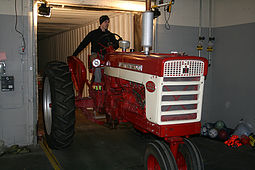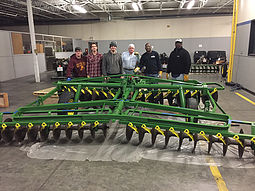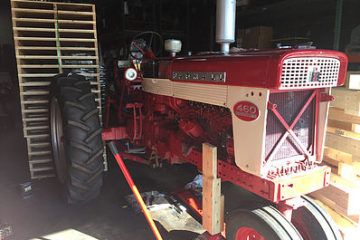Sixty years of wear and tear does a lot to a coat of paint, and we decided that our Farmall 400 needed a fresh one. To paint a tractor like this requires painstakingly removing the built-up dirt, grease, rust and grime of six decades of farm work. Painters must then sand-blast the remaining paint coat off of every nook and cranny, paint a primer coat on the metal, and apply several coats of the surface paint, taking care that it dries evenly so as not to create bubbles or dull spots.
This work can cost in excess of $3,000, depending on the condition of the tractor. Most of this cost represents the 80+ hours of labor that are often required. The inner conservative in all of us shied away from this expense, as the tractor will run just as well without a shiny coat of paint. In talking with others who have done work abroad, however, a coat of paint is incredibly important. To African farmers, this won’t be just a beat-up old tractor; it will be the most technologically advanced, powerful and important piece of equipment on their farm. There is a pride of ownership associated with having a tractor that looks well-kept. Farmers are more likely to keep it inside, conduct routine maintenance, and ensure that it is used with care. While we would expect them to do this anyway, a coat of paint is an important form of insurance to make sure that our project succeeds. This said, $3,000 was simply outside of our budget.
Fortunately for us, Kevin Kolander of Kolander Autobody in Fulda, Minnesota rose to the occasion. Kevin said that if we pay for the materials (roughly $750), he would donate all of the labor from his and his employees’ time. This donation, worth over $2,000, allowed us to have a tractor that we, our donors, and the farmers can be proud of. We can’t thank Kevin enough.
See below a picture of the tractor as it appeared in the Worthington Daily Globe. Pictured (from left to right) are: Kory Staples (bodywork specialist), Kevin Kolander (body shop owner), Jim York (my dad, who has kindly helped with this and all of my other “crazy” ideas), Lonnie Nielsen (bodywork specialist – seated), Kent Shea (former owner of tractor and mechanic) and Lonnie Leebens (mechanic).



